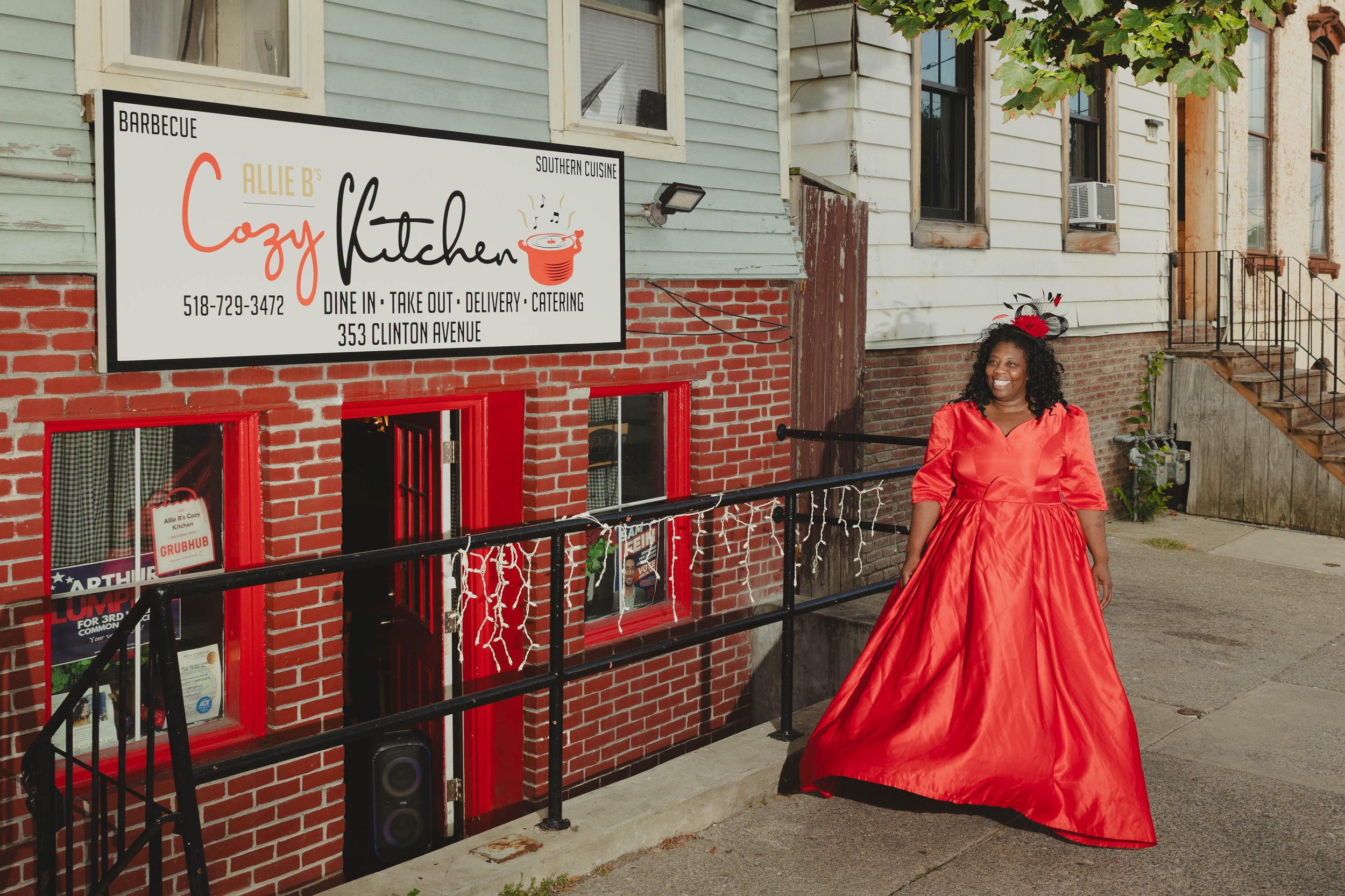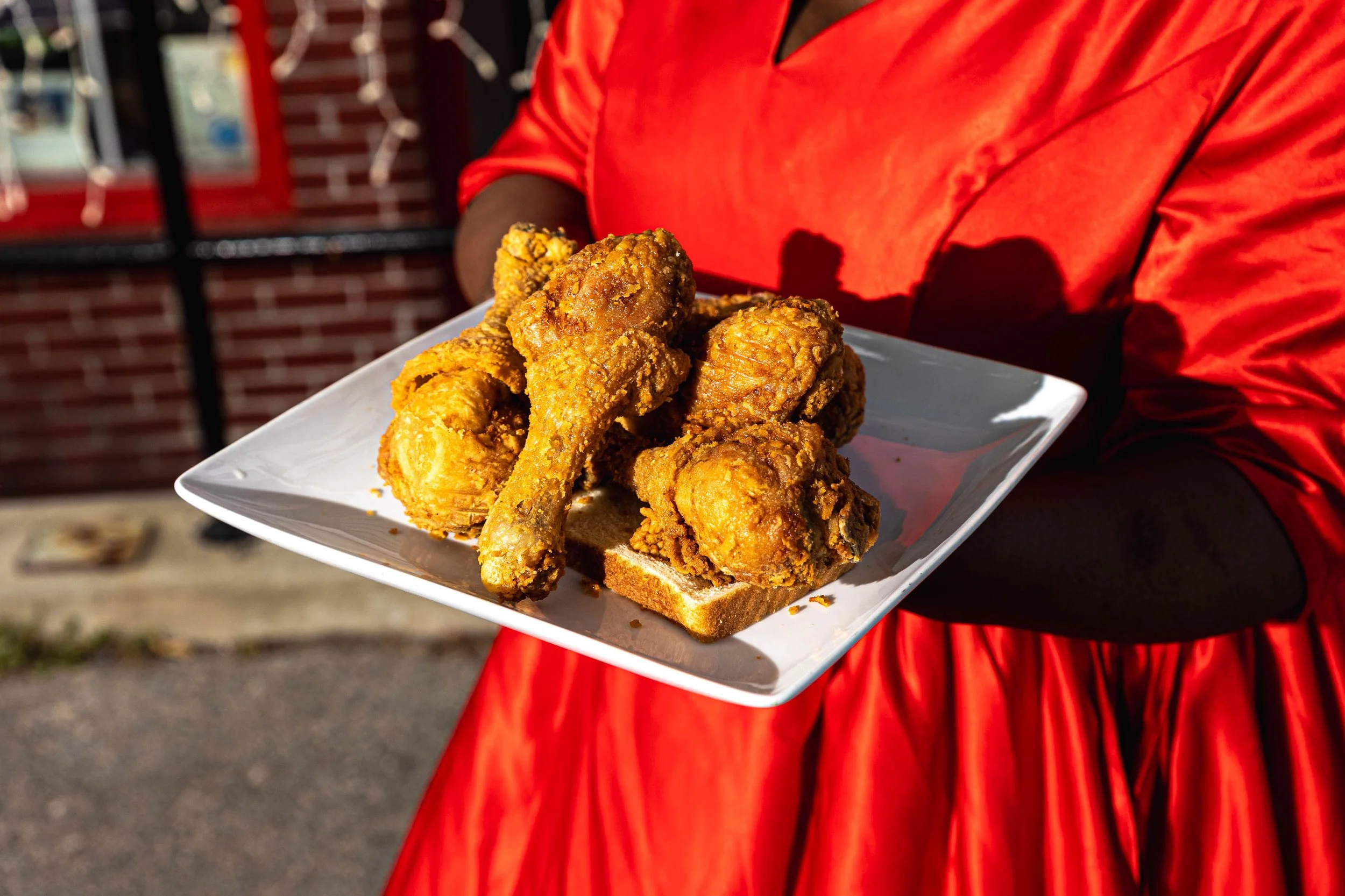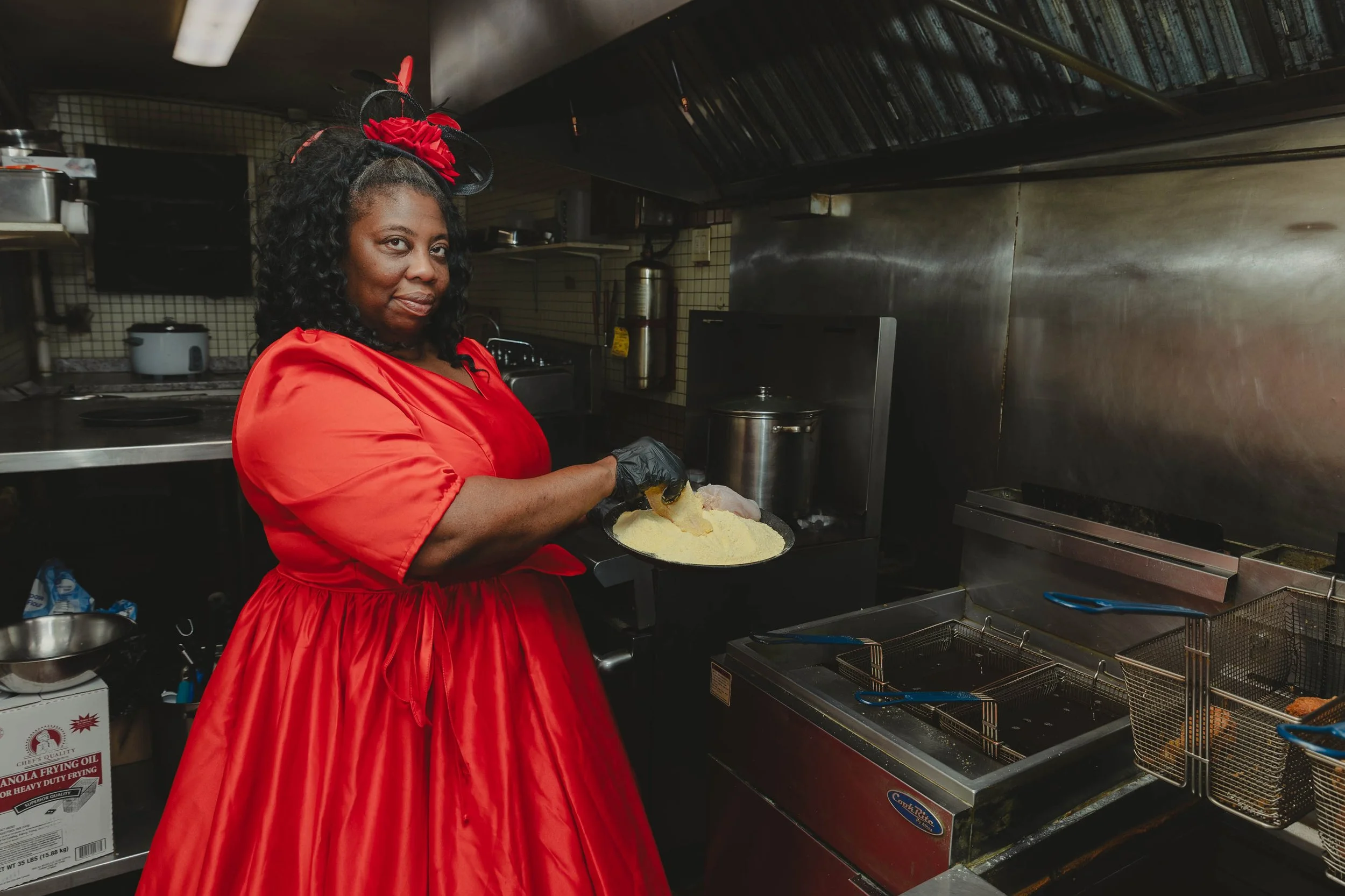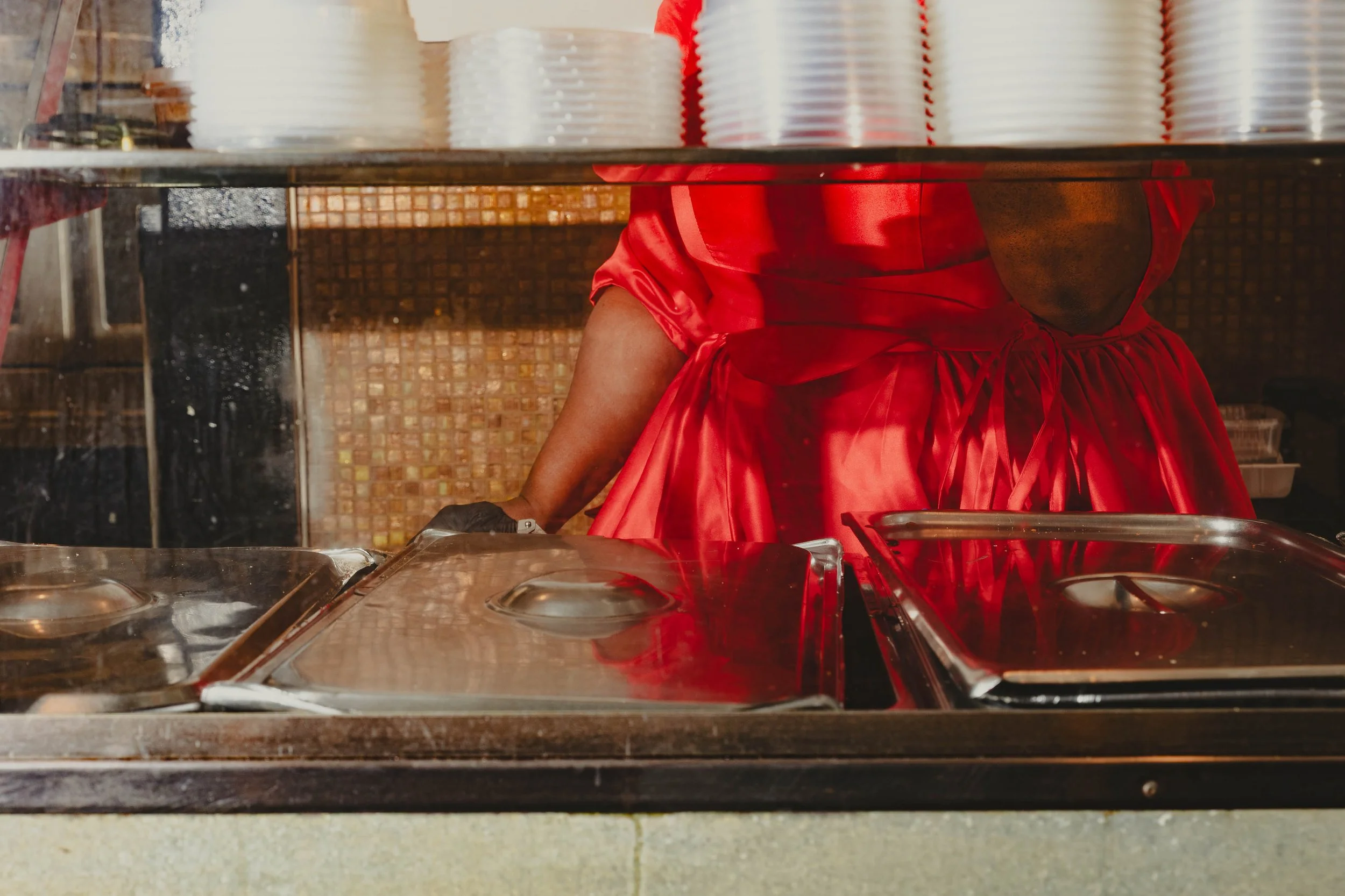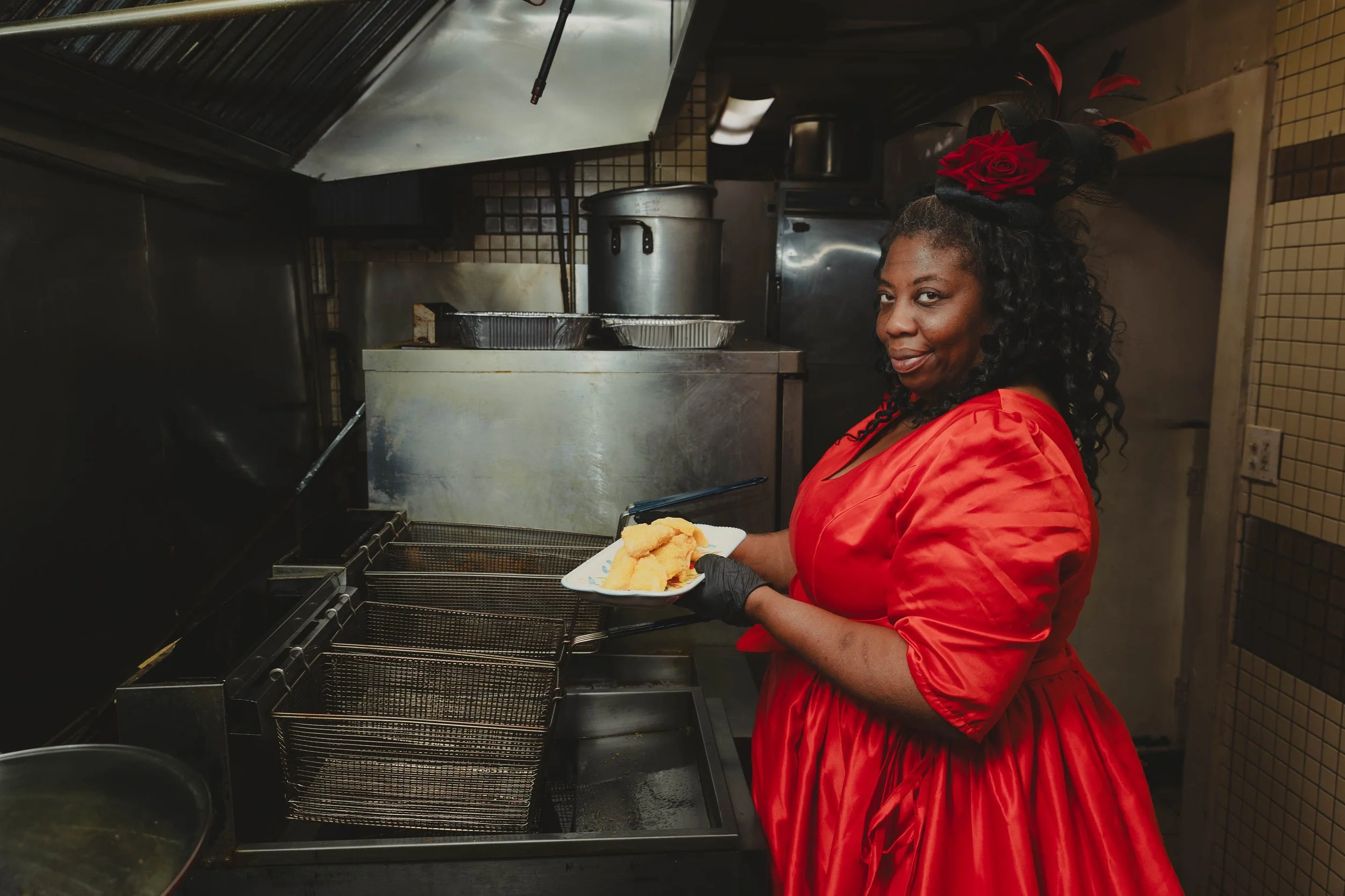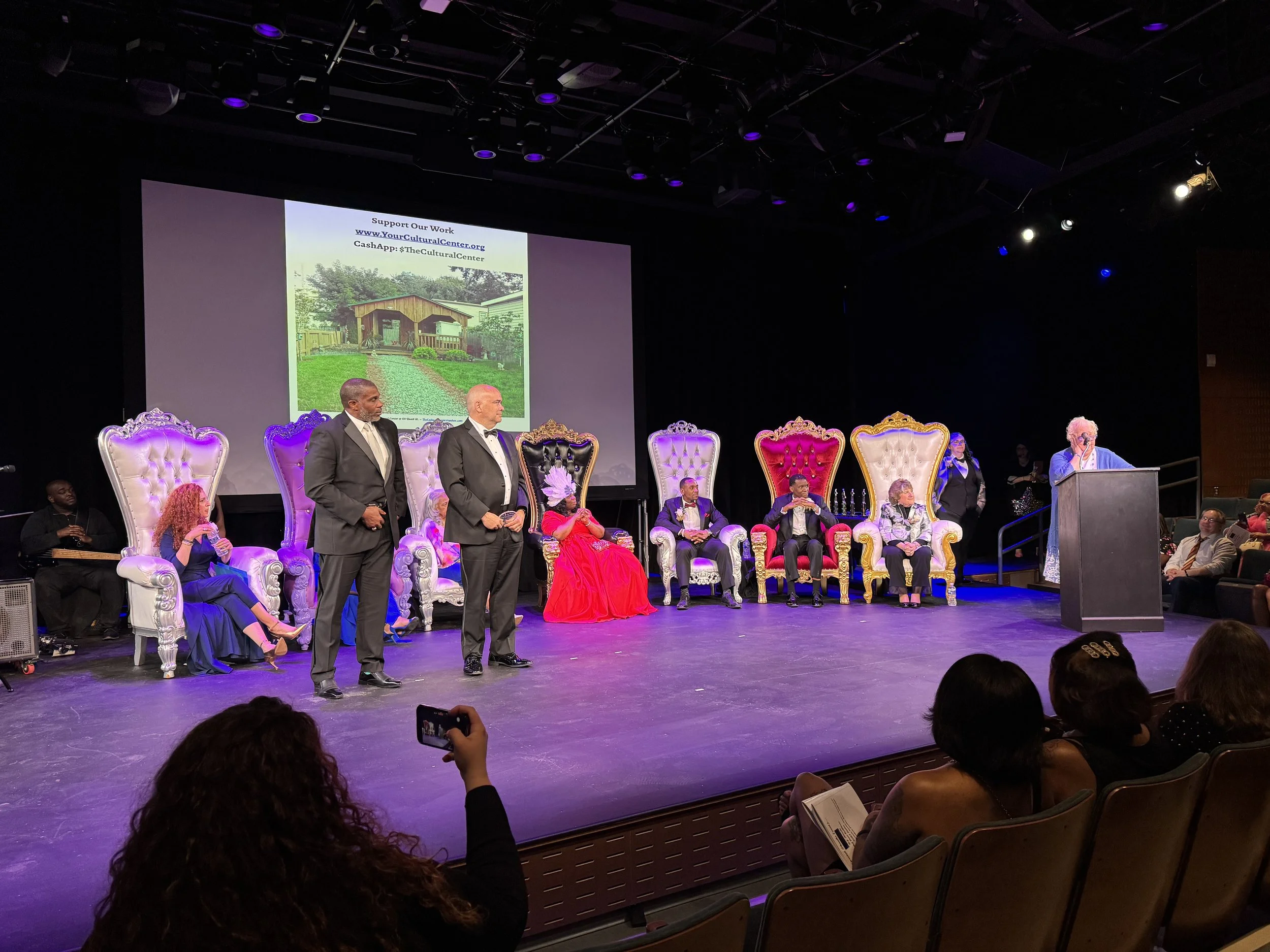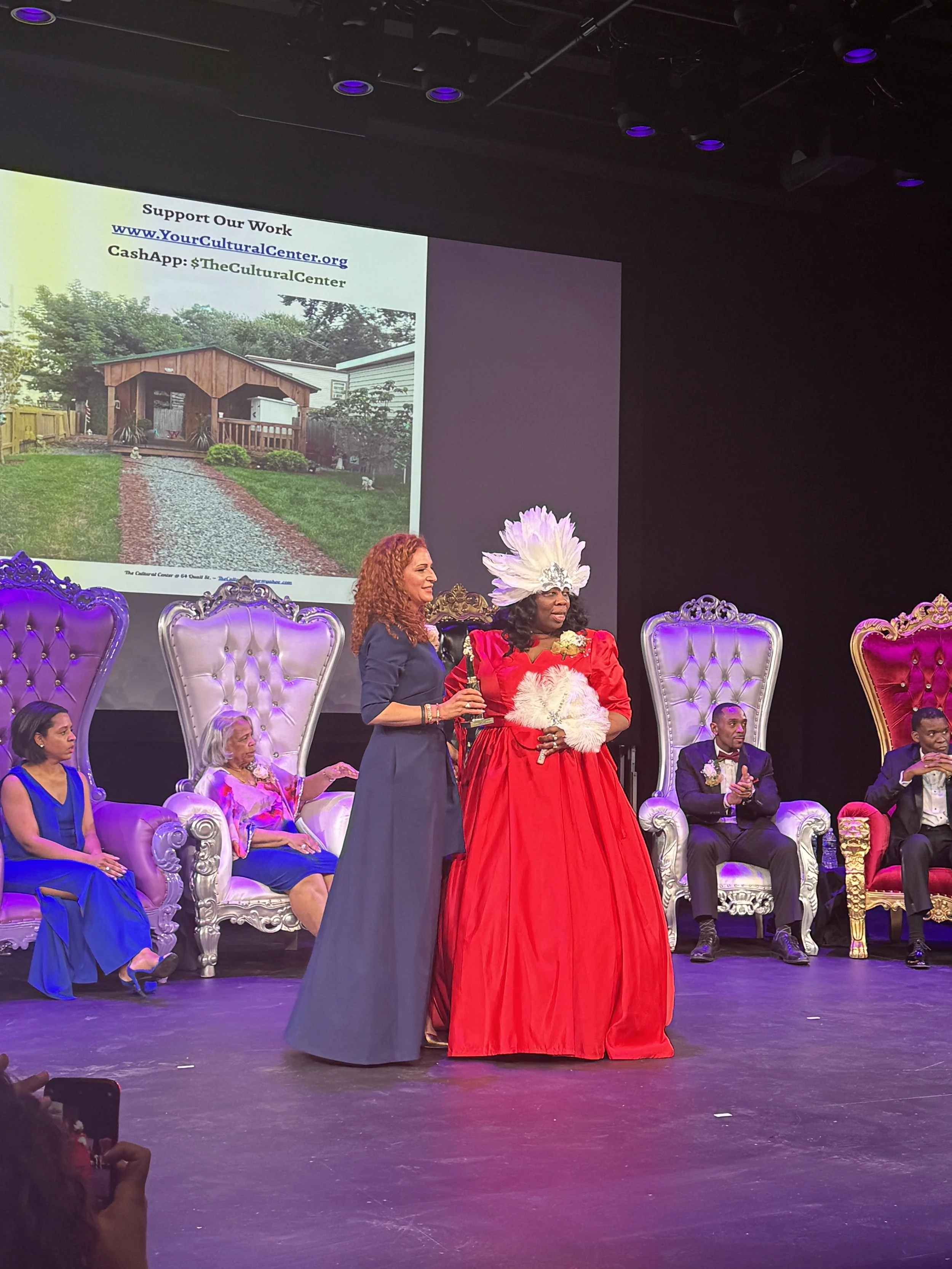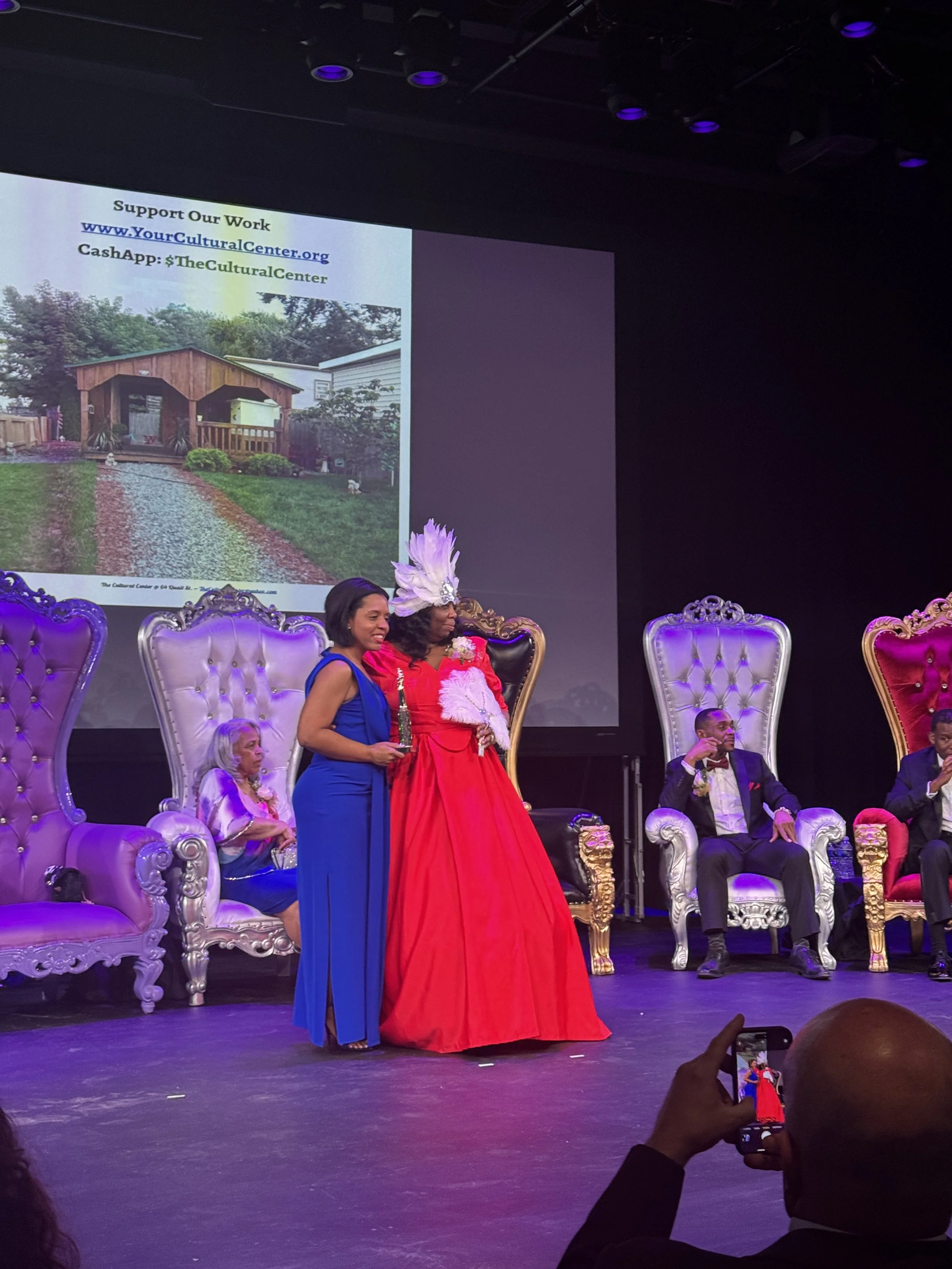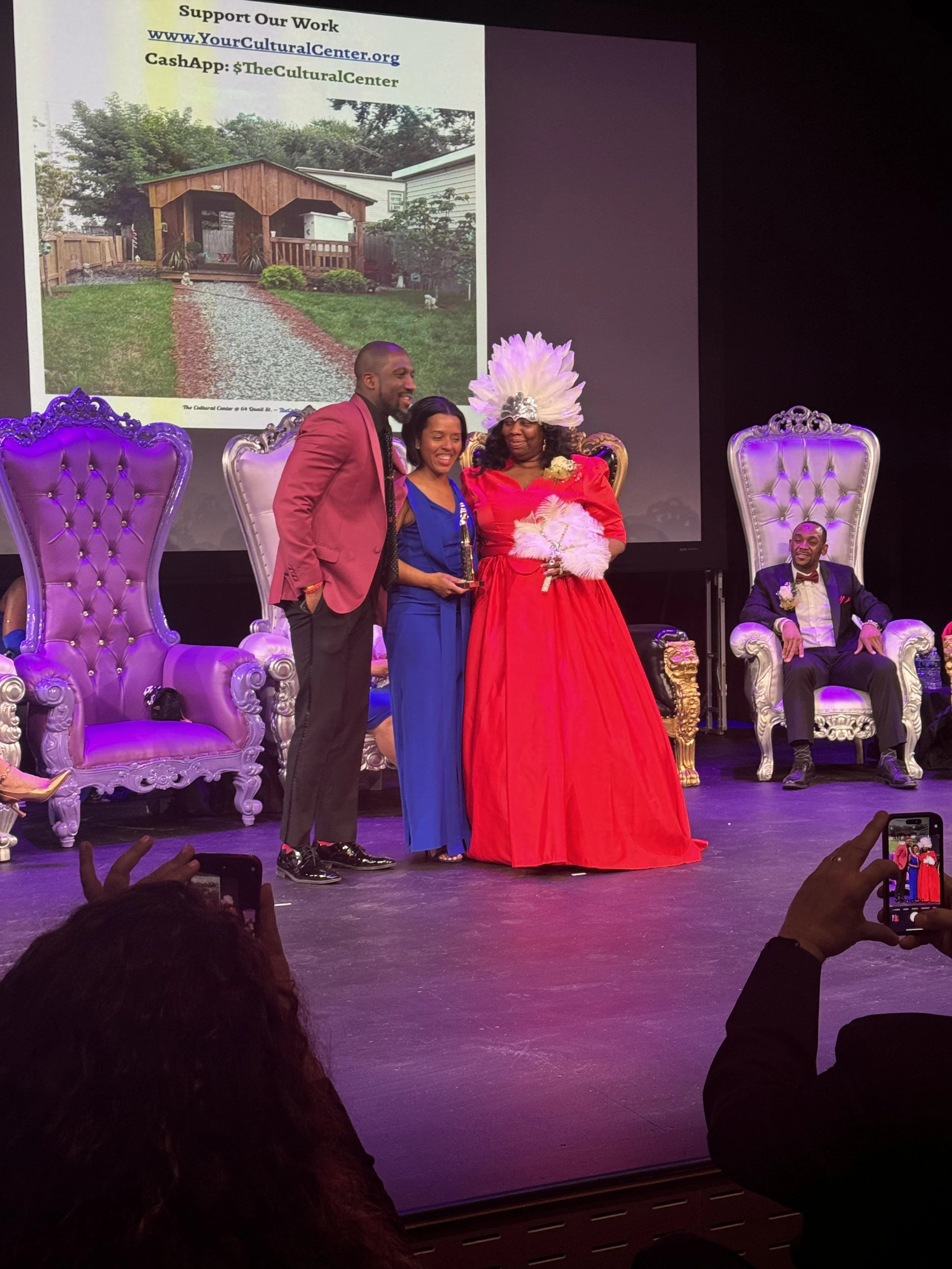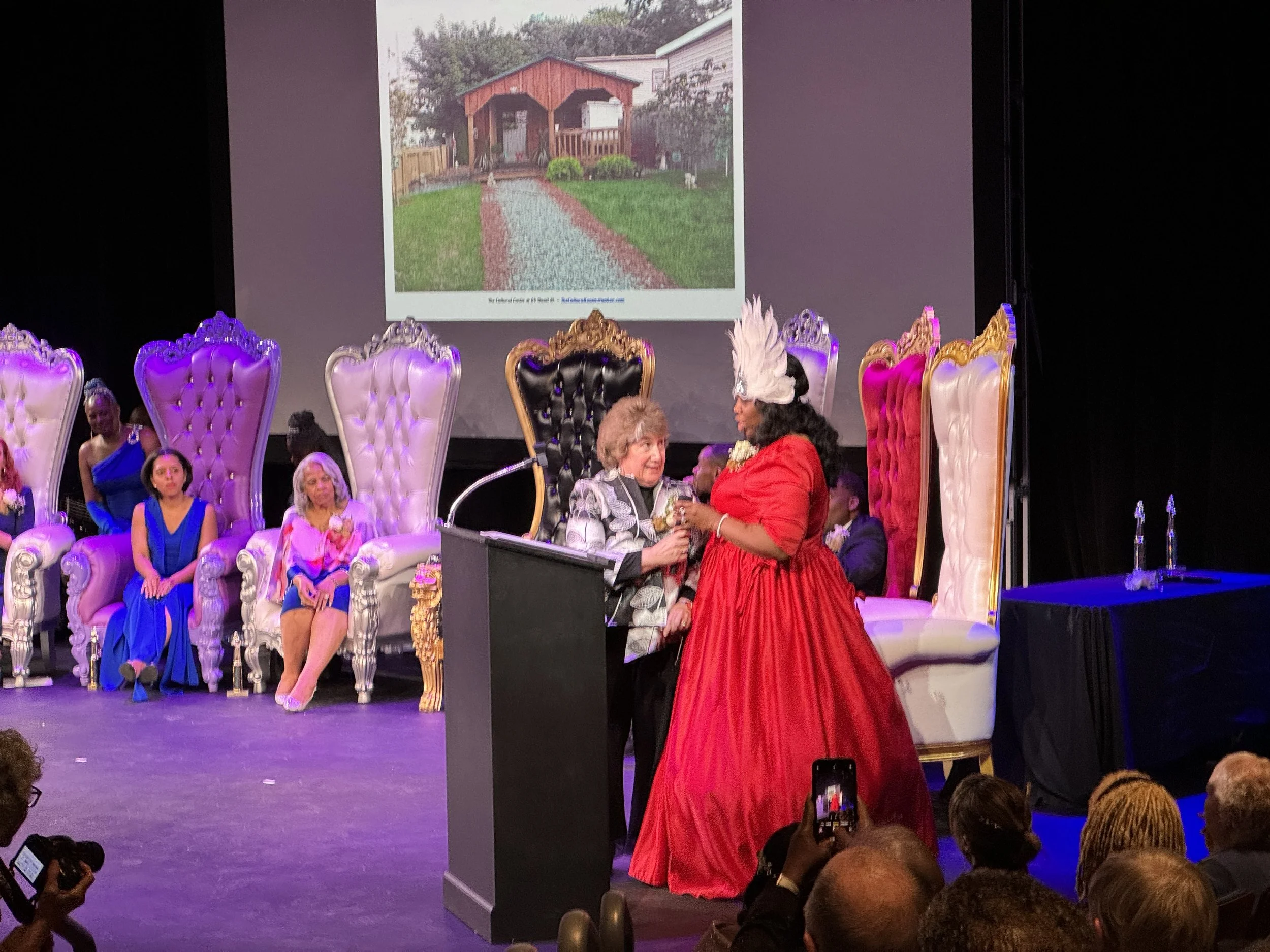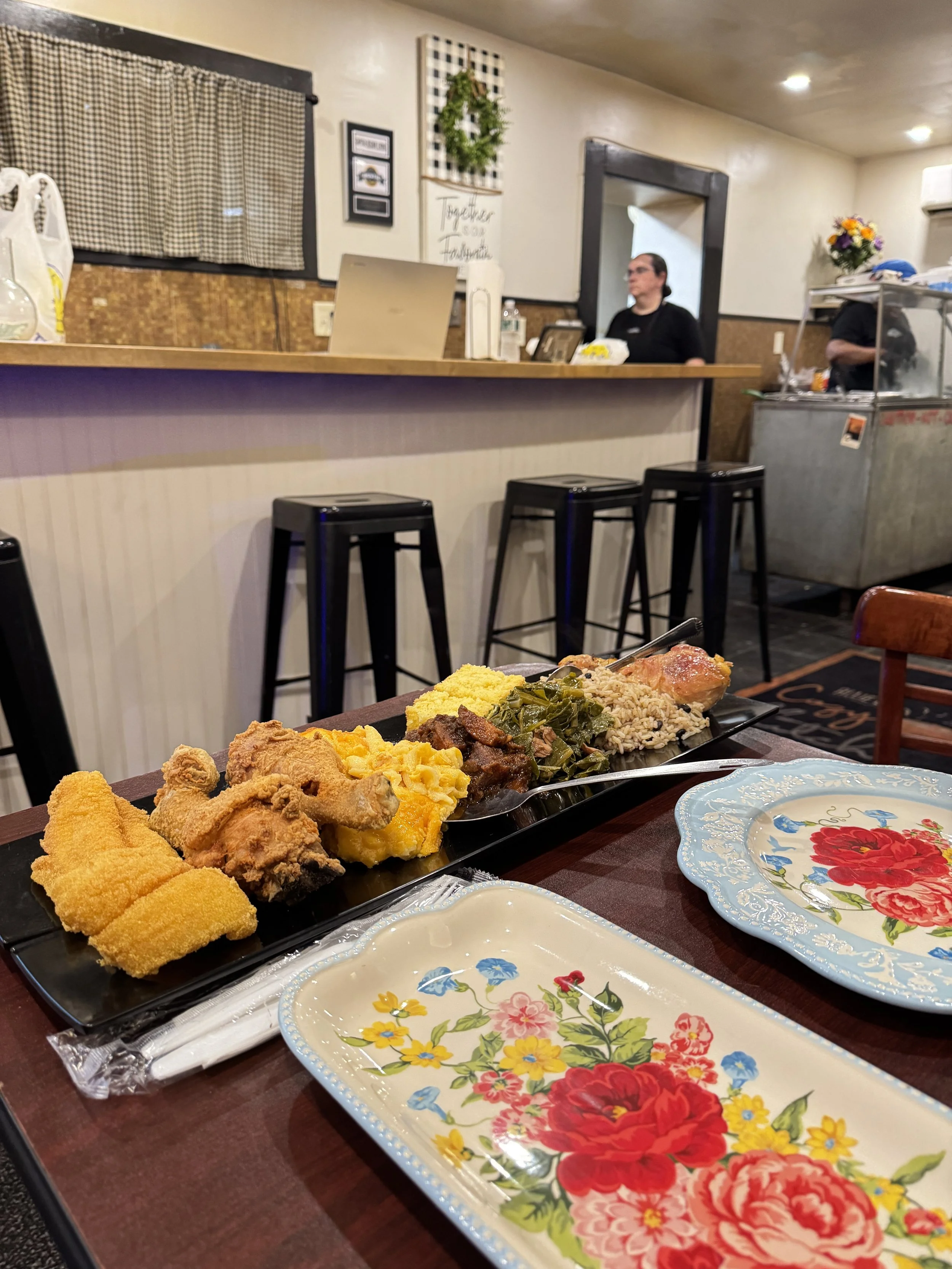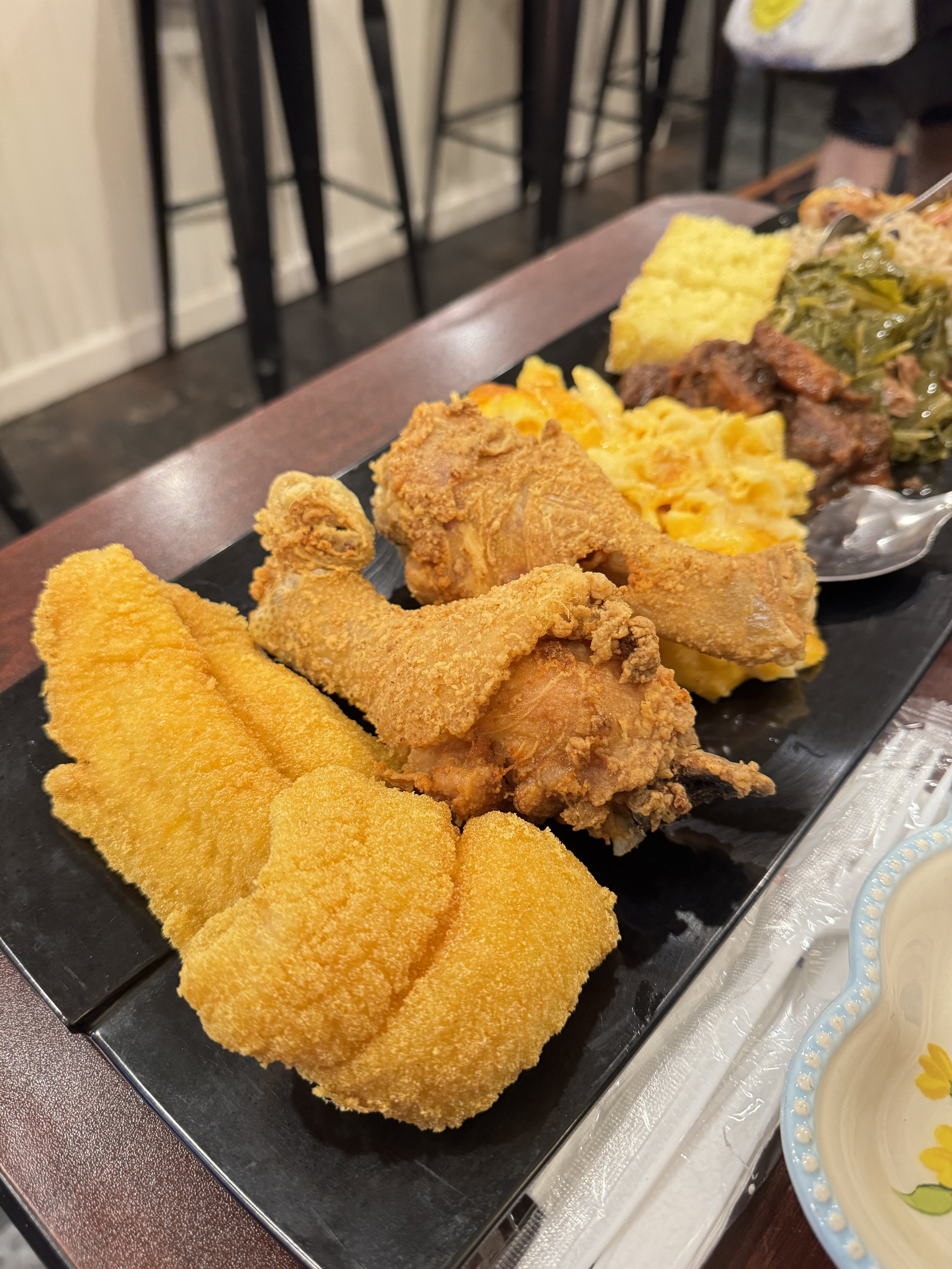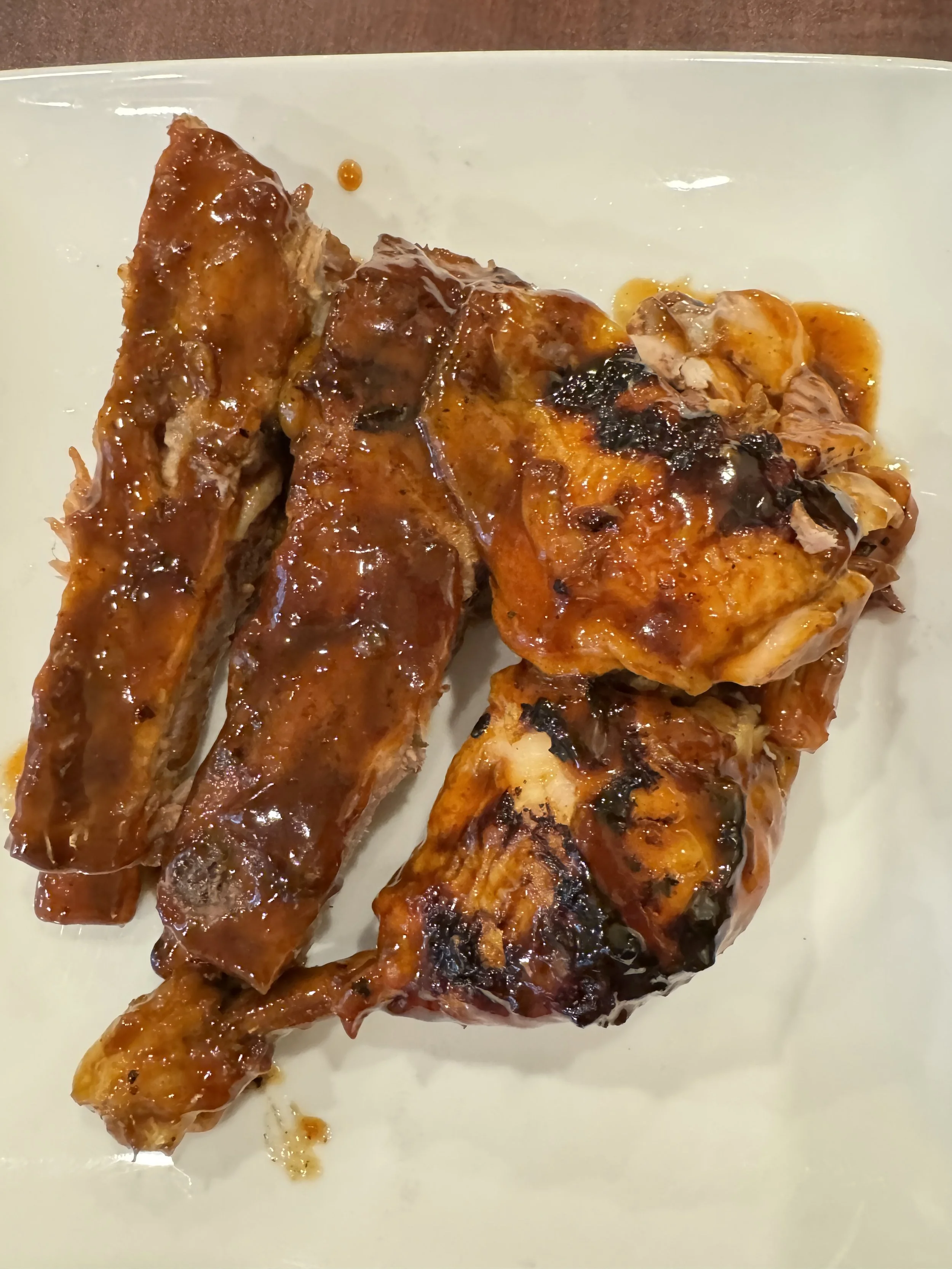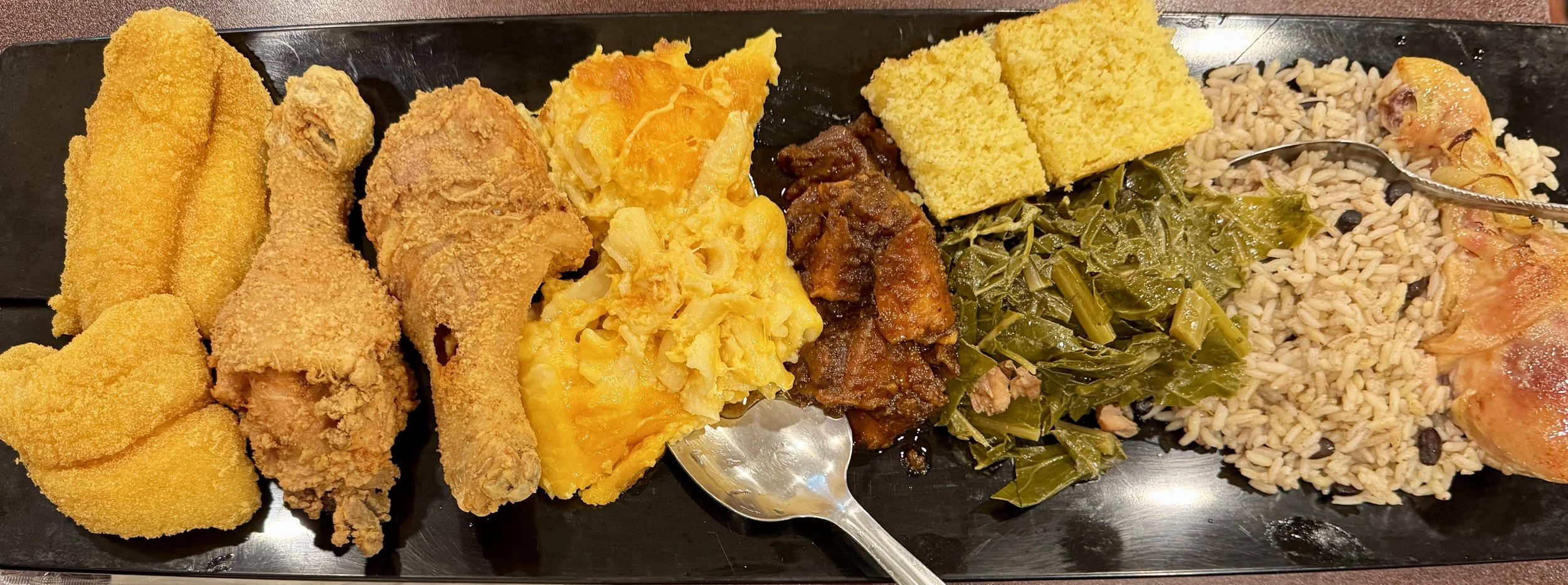MEET: KIZZY WILLIAMS, ALLIE B’s COZY KITCHEN
Kizzy Williams-Francisco outside Allie B’s Cozy Kitchen | Photo: Konrad Odhiambo/The Dishing
Kizzy Williams-Francisco, chef-owner of Allie B’s Cozy Kitchen in Arbor Hill, talks Harlem beauty, fishing, fried chicken + why her gala celebrates Black Excellence + community success.
Interview: Susie Davidson Powell
Creative direction: Susie Davidson Powell
Photographer: Konrad Odhiambo/The Dishing
Shoot location: Allie B’s Cozy Kitchen, Arbor Hill, Albany, N.Y.
The Dishing talks with tastemakers in the hospitality industry + trailblazers at the intersection of food, culture + art. In this interview, we talk with Kizzy Williams-Francisco, the chef-owner of Allie B’s Cozy Kitchen and a powerhouse in the Arbor Hill and West Hill community. Locally famed for her fried chicken and mac n’ cheese, (the latter now available in nearly 100 Price Chopper/Market 32 supermarkets,) there’s love in her Southern soul food and a commitment to community in her multi-prong efforts to support Arbor Hill where her basement restaurant is located. From opening The Cultural Center to distributing free senior meals, Kizzy and her wife, Holly Anne, continue to give back as the business and media interest has grown.
Williams-Francisco has appeared on the Food Network’s Chef Boot Camp, is a regular contributor on local news stations, and has partnered with local philanthropists, Ed and Lisa Mitzen, through their non-profit Business For Good. In many ways, Williams-Francisco’s personality is larger than life. For newcomers, a visit to Allie B’s Cozy Kitchen rarely feels like a first since Williams characteristically throws her arms around guests, introduces her wife, and plates food as quickly as she welcomes them into the fold. Her annual Kings and Queens of Albany gala recognizes the accomplishments of Black leaders and community allies.
Kizzy, it's great to talk with you again. Of course, it's been 11 years since you opened Allie B's Cozy Kitchen. So much has happened since the 2020 pandemic, and especially in the last two years. We're going to touch on all of that, but looking back from when you opened in 2014 to now, how would you sum up the last decade?
Well, I would say I started as a seed. I can remember the first day that I opened Allie B's privately, not to the public. And if I'm right, that was March 30th, 2014. I invited some of the people from the community and they came and paid a fee where I cooked for them and the money that they paid for that dinner I used to buy the food to sell the very next day. I really had nothing... You know, at that time, I was a mother, and I was receiving food stamps, I was on assistance, I was on Section 8, and I had a dream that I dreamt of for decades. So it started that day, and our Congressman Paul Tonko showed up. It was late, about 9 or 9:30 at night when everyone had left, and he shows up and my son says, "Mom, there’s someone at the door for you. Looks like an old white man!" [Laughs] So we let him in, though it was just us in the store.
We must have got out at 1 o'clock that morning because we had to clean up. We sent the kids down to the house because I only lived three blocks down from the restaurant, and Holly and I stayed there until about 1 a.m. cleaning up. And I got up the next day and came back to the store at 6 o'clock the next morning because the restaurant was open seven days a week from 12 noon to 10 p.m. Isn't that something? I took all the food and Holly – at that time she worked at the Capitol - so she would go get the food from the warehouse, drop it off, and go to work. And you know, when you open up a business, someone needs to have a steady job, so it was a good thing she had that. But I can remember saying all I need to make to get me through is $100 a day. And you know, if I made $100 a day right now, I would not be able to pay my bills. So here we are. In 2014, $100 a day was $1,000 a day for me. Isn't that something?
Growing up in Harlem, your mother - the original Allie B - sold her fried chicken on slices of white bread on the street. You chose to name your restaurant after her, but many people think you're actually Allie B. How does that feel?
Well, as a little girl and growing up as a teenager, I did not want to be Allie B. I didn't like the name, I did not want to be Allie B at all. But here, I opened up this restaurant and named it after my mother because as you get older you value your mother. Allie B is this woman who changed her life; that picked cotton and lived on a plantation in South Carolina. And being her daughter and having her name, I feel bonded to her. When I think of her life – she worked with Charles Rangel, the congressman. He was in charge of the House Ways and Means Committee when Barack Obama was president. So just that guy being a very good friend of hers growing up, not only thinking of how she was through her food – because she cooked for all of these interesting people – but she was also on boards with them. And look at me now. You know, from the first day when we opened up Allie B's to that private group and Paul Tonko, our congressman, and our community showed up, I learned some things. Remember you said to me that birds of a feather flock together? I never heard that saying like that until you said it to me and it has stuck on me.
Allie B, she worked, taught, she believed in the community, she believed in cooking, she never stopped dreaming. You can tell with all the things that she has done and I'm just so grateful to carry her name. Eventually it’s going to be on my birth certificate, because that's how far I'm going with it to carry her name, Allie B, right? And Kizzy. I love Kizzy as well. Kizzy is the name from the book, Roots. It was Pa's daughter, this powerful woman. And you know what? Growing up as a kid, I didn't value my name either. But you appreciate everything when you grow up, and you become that woman as you're following your journey. I am Kizzy and I am Allie B so I am fortunate to have both. You know, my brother wrote me for my birthday this year and what was special was that he put “Kizzy-Allie B” and it just made me so happy to know that the woman he loves the most, that he feels like he can call me by her name.
We’ve spoken at length about your childhood so I want to share a little of the backstory here: You grew up in the 1980s and ‘90s Harlem with your Jamaican father, Leroy, who was superintendent for New York City Housing, and your mother who moved to New York from South Carolina to work as a domestic home health aid, as well as her many community roles. Your father, though, was a keen fisherman. You had five freezers filled with fish in a three-bedroom apartment where you lived with your parents, three brothers and sister. At five years old, you collected cans and bottles for the bottle return, but as a teenager you sold the fish your father caught.
Can you tell us a little about this experience, and how the fish of your childhood connect to the fish you fry at Allie B's?
Yes, when I was a little girl, five years old, we’d collect those cans and take them to the store and me and my friends we’d get the money and have a little party. When I turned into a teenager, I would say, "Mom, Dad – can I have some money? And they'd be like, "You can sell that fish that's in the cooler." And you know what? I never hesitated, because I was always selling things, not just the cans and bottles… belts, candy bars too. But when it comes down to the fish, you know, I grew up on the water, even though I lived in Harlem, New York.
My father had a regular job for New York City Housing but fishing was our life. We would go fishing every week, every weekend… to the lakes and a lot of times we’d fish right out of the Hudson River. I grew up going right down to Battery Park in New York City to fish. I can remember laying on the benches or sleeping in the car because they would be out fishing all night. And my mother, she made sandwiches while my father fished. Everything we did was fishing. We went to the Great Lakes and they fished. We would catch crabs out the Atlantic Ocean. We would catch the lings out the Atlantic Ocean. And when I got older, he would take me deep sea fishing. I love deep sea fishing – that was out in Massachusetts and you get on the boat and catch blackfish and bluefish and porgies, but catfish is something that you can catch everywhere. I grew up off of catfish. I grew up cleaning fish; when I was 10-years old I knew how to take the pliers and pull the skin back off the catfish, 'cause that's what type of fish the catfish is. It has a skin that you have to take off.
We ate fish very fresh and sometimes we’d grill it right there at the lake or the river; wrap it up in aluminum and just throw it in the fire. Same thing with the crabs. With the crabs, we would take the aluminum - the crab be alive - pour some beer on top, cover it up, and throw it on the grill. Eat it right out the river. When my father would come home with fish, we would immediately clean one and fry it in corn. Back then, we were using lard, so tons has changed. You know when you go to the store today and see a whitey, that's one of the cheapest fish in the store and that’s what most people ate. Porgies are so expensive. Catfish are expensive. You know, these fish that my father bought home was very expensive fish, but when you're a kid, you want what the world is eating. So the ling tastes just like the whitey – it's just a bigger fish. Absolutely delicious. I'm gonna have to cook that for you.
We also had five fish tanks – my father loved caring for the fish and we didn't eat those, but he loved the water like that. Life at home with Allie B and Leroy was full of food. Yeah, it was full of love. I never needed anything. I just wanted things, you know? And my parents was very strict. They would have us sit down at the table when it was time to eat. And I thought life was harder then, but, you know, when I look back, I see how blessed I was. For sure.
My mother and father, every holiday whatever the weather, we had a cookout. It could have rained. If it was the 4th of July and it rained, we were still having a cookout. So that's how I live my life. Like with my nonprofit that we created for when I do things for the community. It can snow, rain. I still go out there and provide for the community because my mother, Allie B, she never let the rain stop her. And she always gave people the best. So when I give to people, I give them the best.
But back to frying the catfish at Allie B's… That corn meal is the same exact way my parents did it. And when I eat the fish at Allie B’s, I can taste the sweetness of the fish. See, that's what I look for; I look for the sweetness and the freshness of the fish. I can taste if a fish is not fresh. But not only that – chicken, too. I know what fresh meat is.
When I interviewed you previously, you told me that while other kids were eating frozen Salisbury steak, you were eating raccoon, turtle and eel. You said you were a “southern girl growing up in the middle of New York City.” Can you tell us about this?
Well, my mother was a hillbilly, believe it or not, and my mother grew up eating raccoon. But, first of all, my father was a fisherman and when you go fishing, there's always snapping turtles. Okay? But eel was like peanut butter-and-jelly sandwiches in our house. It was just so common to have eel. It was there every day. And raccoon. There was a truck that came from down south and they would sell raccoon, deer meat, sausages, chopped barbecue. We knew the man because he lived in the next building from us, so he would sell those things, and my father would come home with like a deer leg, and I would be so upset because everyone saw him with it. Still to this day when I go home to New York City, I run across people that may say, “You still eating turtle?” or “Where’s that turtle at?” You know, when you're a kid, you're ashamed of certain things, but now as a woman, I have pride in myself. So, I know am different… and to be different is to be great.
So my mother, from the time I was born, especially with this name, Kizzy, and her being this hillbilly-type woman that provided, she would take me to slaughterhouse in Harlem. — Let me think of the address. I believe it was 122nd between Lexington and 3rd – and she took me in this place. Now, as a woman, I think about what she did. That was special, okay? Because she took me into this meat house, and you know what she said? “What quail do you want? Pick out your quail.” And so I picked out the quail that I wanted. She would get, like, eight quails, and take them home and clean them and take the feathers off... and fry it up and put it in a smothered gravy. It was so good. These are things I didn't want the world to know. But I loved the quail and I grew up eating quail eggs… we would go get duck from there too, so you know the meat was fresh.
I'm going to segue here to talk about the flavors in your food. You’ve told me your rice-and-peas has influence from the melting pot of Harlem where there were clearly defined Black neighborhoods, Italian neighborhoods, Latino neighborhoods, and many of your friends were Catholic and Latino. What is it about the flavors of Harlem that show up in your southern cooking at Allie B's?
Well, Allie B, when she made rice and beans, she'd use peas. And in Harlem, the Spanish people used the black beans in the rice, so that's the difference with me using those black beans from Spanish culture. But also I have two fish and two fried chicken on the menu. I have one fried chicken that is South Carolina – the way my mother made it – you know, with just some salt, some garlic; and then I have that fried chicken that is Harlem made with sazon and adobo. Because the people in New York is full of culture. You have the Spanish people, you have the Italian people, and you have these Black people. Being part of Harlem, the food is whirly because of the spices. You find a lot of people from New York like their food very well seasoned, so when you come to Allie B's and order the Senator James Sanders fish, (that's Senator Sanders from Queens, Far Rockaway,) it’s a heavily seasoned New York fish. Sazon, adobo, lots of salt, very flavorful, where you taste the spices and the fish is hidden. But the regular, traditional Allie B’s fish is a South Carolina fish fried in cornmeal and lightly salted. You can add pepper if you want, but that's it. Salt, some pepper, cornmeal. When you eat the South Carolina fish, you taste the fish, you taste the ocean, you taste the land, and that's the difference in the food. One is of the earth, one is of the spices.
You know, it’s funny because in my community in Harlem, where I grew up, I thought the Italians were African, Black, just like myself. As a kid, when you leave you take your home with you and you come back with it, but as an adult when I left Harlem and started to travel the world, you learn things, and that's when I learned that Italian is white or European. They are not African descendants. And it was just like, wow. What I'm saying is that when you grow up in a place that does not speak different, you feel like everything is the same. The world that we go into speaks different. And, as a person that works with a community, I love the world. I feel that we all are one. And I guess that's what makes me happy. I don't separate or divide us as people. I feel like we are one, and my wife Holly, her family is German and French, so we all come from just one space when it all boils down to it. So food and race, it's really all the same pot.
You grew up cooking alongside your mother. Is your fried chicken made the same the same way she made it?
Yes, it shocks me when you turn on your TV and you see people that have buttermilk and eggs, and they brine the chicken and soak it overnight. We never did that. My mother just fried that chicken up, salt and pepper, and garlic (like I said, she did put the garlic in.) And this is how I learned as a child, how you know fried chicken is good. I was always taught that fried chicken, if it's still good when it’s cold, that's the best fried chicken. Because you should be able to grab that fried chicken right out the refrigerator and it should still have a crunch on it, it shouldn't be soggy. When I opened up Allie B’s, I said I'm going to follow the rules. I wanted to be authentic to her, to Allie B, and do what she did because it worked.
I guess when I think about it now, when you see someone like my mother, Allie B, succeed in so many directions, I knew Allie B’s was going to succeed. I never thought for a moment Allie B's was not going to succeed. Why? Because I worked seven days a week and I believe that if anyone works seven days a week, you may not have the money that you want, but you will succeed. You're making it. You will make it. And that's why I'm successful. I'm also able to have certain things, because Allie B's Cozy Kitchen has opened up so many doors for my family and also for my community, you know?
You were living in a shelter in the Bronx with your eldest son before you moved into an apartment and enrolled at the Bronx College to study Management and Culinary Arts. Did you imagine that one day you'd be cooking, catering and running your own restaurant? Was that your dream?
Yes, it was. It was a dream and I never stopped dreaming.
You moved to Albany with your two children in 2006 and met your wife, Holly Anne, while you were working at Walmart and together opened Allie B's in 2014. What made you start providing meals to seniors in the neighborhood and the Thanksgiving dinners? What made you feel it was important to feed the neighborhood in addition to running a restaurant?
The first year I opened I did the Thanksgiving giveaway. So I opened in March and Thanksgiving came in November and — it makes me emotional thinking about the first year. I remember it snowed on Thanksgiving Day and I said to Holly, I don't think no one is going to come. And she said, “People are gonna come.” And you know what? They did. I've fed the community with those dinners ever since, every year, just like my mother. Every holiday, she would cook for the community, enough food for 200 people for the 4th of July. And the community will always come eat. But really what inspired me to give back on Thanksgiving is that when I was living in the shelter, the shelter took us out to eat at a restaurant on Thanksgiving Day. Never have I ever been to a restaurant for Thanksgiving because my whole life my mother and my family always cooked. This specific Thanksgiving I just didn't go home. I could have, but my mother had passed away, I was in a shelter, and the shelter was doing something nice, so I said I want to go. And it was meant for me to go and experience how this restaurant in New York City allowed these families from the shelter to come in and eat. And you know what? People are not worried about the best food… ‘Cause when we went to that restaurant that Thanksgiving day, the food was okay. I was just so happy to be able to have that dinner. And then they took us to the movies to see The Polar Express. So I could never forget that day, okay?
And here I am today. I'm able to take that same experience that I went through in the shelter and make something positive for my community. And tell people, “Guess what, I've been in the shelter too.” Because sometimes people are ashamed, but also people judge people. And you know what? I was thinking about Tyler Perry, this successful man who lived in his car. And Steve Harvey – he was homeless. There's so many other successful people that have experienced what I have experienced. As you know the saying, if it doesn't kill you it makes you stronger, and my moments in life have made me stronger, but it has also taught me how to be good to people. And it has also allowed me to not give up.
That's powerful, Kizzy. Okay, let's talk about The Cultural Center. What inspired you to buy, literally, a vacant lot and how do you now use The Cultural Center to empower the community?
Well, what inspired me to buy the empty lot is my history, my family, not owning anything, and wishing to just own something. I had bought my first home a few years back, but I wanted so much more because we did not own anything. So I said, well, I want this empty lot. And I'm going to do something with this empty lot. I didn't know what I was going to do with it at that moment, but COVID showed up. Before COVID people would come into my store looking for resources. I mean, sometimes I would have five people just sitting around the store waiting on me to talk to them about jobs, housing, not giving up. You know, they may need milk for their babies or food. So in 2019, I bought the land and in 2020, I utilized the land and turned it into The Cultural Center. What's crazy is that I had closed the restaurant down for walk-ins because I was so scared of COVID that my doctor gave me medicine because I was shaking. I was so afraid. For two years, my store had no walk-ins in the store. I didn't express it to the world; I would do radio shows and all kinds of things over the phone, but I was afraid.
Then here I am, because when God has a journey for you, he will stop one journey to pursue his other journey. So he closed down my restaurant, even though it was open for people to pick up the food and leave. And then I opened up The Cultural Center. I had to to buy dirt for the ground… it cost me $25,000! Just dirt is so expensive! So I had to buy dirt, I had to pay people to clean the land up because the land was full of glass and I had to buy the house-shed that I bought for the property. I had to buy a fence. I mean, one tree would cost $350 and they charge you $125 just to put the tree in the ground! And I needed like six trees. There was no grass, so I bought grass. That's not cheap. I did all of that – Allie B's Cozy Kitchen allowed me to buy this land. I bought it for myself, but it wind up being for the people. I use it for the community. And it has been so fulfilling. The tax ID records for The Cultural Center say Williams-Francisco: Williams for myself and Francisco for my wife, but I said to her, “I like Williams-Francisco, but I want the world to know this is The Cultural Center.” So that’s what we did.
And you're teaching people how to buy their own land, right?
Yes. We teach them how to buy land, how to buy a house. We teach them how to, if they want to go to the military, they can go to the military. If they want to go to college, we help them get in college. We help them get in training programs. We send people on vacation trips. Why? Because it's a must. I know that if I didn't go places, I would envy who I am. And we all know in order to grow and be great, you must go to other places. So we help people travel, like I said, whether it's senior citizens or young people.
We have done over 325 swim lessons that we have paid for to teach people because in our community, people can't swim, right? I was doing a row-boat camp and I had 25 kids signed up and only three of the kids knew how to swim so they couldn't do the camp! That's what made the swim program come along and it lasted for three years. There’s so many things that The Cultural Center has done. I do the senior meals through The Cultural Center, even though it's Allie B’s kitchen cooking the food. In order to get help, you have to have a 501c3. And so Allie B's Cozy Kitchen has opened the door for my family to grow, but also the community to grow. We have had, you know, three to four billionaires just show up in the ‘hood to meet us because they wanted to help Allie B’s. I also tell people that when you come through the doors of Allie B's Cozy Kitchen, when you get ready to leave, make a wish because Allie B’s make miracles. So because of Allie B’s, we have The Cultural Center.
And, you know, we stop crime! We stop crime through food. We stop crime through love and it is just overwhelming. And you know what? Ever since since we've been there, we haven't had no killings on that corner. No one has died on that corner since we've been there. And the people actually take care of it. You have to teach your community and love them and let them know that I'm nothing without you. Right? People know that everyone needs someone. I also think about what people would do for things that they want. Just because you may do bad things don’t mean you're a bad person. My mother was very disciplined and I didn't want to get in trouble, so I didn’t do bad things, but I think about people who didn't have someone like my mother to give them structure, leadership and direction. I know how easy it is to slip up because I come from the ‘hood. I know drugs. My oldest brothers, both of them passed away from drugs. So even though I have been able to go down a straight road, there are many people that stood right next to me and they were unable to go down a straight road because people make mistakes.
[Ed. note: CashApp: $TheCulturalCenter]
That encapsulates so much of what you do, but you touched on the importance of travel. I know how much you and Holly love history and travel. Do you have time for vacations? Where have you been or where do you want to go?
When the boys were little, we would do so many things. Every holiday we did something whether it was Lake George or Canada or Mexico. We would travel to Martha's Vineyard. But you know, when your children get older, you don't do certain things anymore, so I told Holly that we are going to invest into ourselves. You know, 'cause in the beginning, all my investments have been either for my family or for my community. So we're going to the Netherlands for Christmas. And in January, I booked a trip for us to get on a boat and we're going to go to the Bahamas. Now, we've been to the Bahamas before. We've been to Bermuda, but this is different. What makes this different is that we're going to the Netherlands for Christmas and then the next month the Bahamas, and in February I'm looking for us to go to a ski resort! We were out at Jiminy Peak and I said, you know what? We can rent a room for seven days at Jiminy Peak and I can still go to work because it's 30 minutes away. Isn't that something? So we're going to live more for ourselves. And because I'm only 47-years old and God has given me so much at 47 with this dream that I prayed for.
You know, there’s a picture that sits in my bathroom, not even a picture, it’s an amazing note that someone painted and it says, “I remember when I wished or dreamed for the things that I have now.” And Susie, these things, like the house that I live in, my home, is my dream house. I love it. And the life that my son Nicalis lives – you know, he is the first one to leave and go away to college – I'm so happy for him because I know that's growth. And he has changed in so many great directions. Before he went to this school, he wasn't political. Now he's into politics. He's listening, he's paying attention to the world. He wants to create. And so that's so important. And so here I am a creator, and Holly is into politics. And Allie B was into politics. And here goes this kid of ours. He is us.
Now I often ask chefs and restaurateurs how they create a work/ life balance and protect their health and mental health. You mentioned your beautiful home in the country which you're restoring, and it's your sanctuary. But I also know you hoped to provide something for your boys by moving upstate to Albany. Your eldest, Nicasio, attended Albany Academy while you were still on food stamps and living in Section 8 housing on Clinton Ave; your youngest, Nicalis, attended Cohoes High because he chose to go to public school. So let me combine two questions here: How important is this home to your work/life balance and what is it you're providing that's either different or similar to your life in Harlem?
This home that we have today provides security and safety, and it gives the boys ownership. That's what I wanted to provide for them. I wanted to provide security where they have assets with something that's not just money, because that's what I wanted to teach them. I wanted to teach them that it's nice to go to work and have money and pay your bills, but you also need structure. This hope that I provide for them gives them structure. Why? Because it's something that belongs to them physically. Something we have earned and the difference of being living in Section 8 housing is that you don't own that – it belongs to someone else. Being able to own something gives you confidence so that when you're out in the world and you're sitting in a community of people who own homes, you think different, you walk different.
And it is different. You take care of your property. You mow your lawn. You clean your own streets. You can see where I come from: My father was a supervisor that was paid to make sure someone cleaned the housing facilities, the properties. People who would mop the hallways. Here we have to mop our own hallways, if you have one. You know, we have to sweep in front of our own building. We sweep our porch, we mow our lawns. And I'm grateful. And we also have grass. See, I moved from Harlem to the Capital Region because in Harlem there wasn't any grass for the children to go out and play on. Now they have grass. And not only do they have grass, they own this land.
Can you talk about your annual Kings and Queens of Albany gala, who you honor, and what prompted you to do that?
What pushed me to do the gala is that coming from Harlem, Harlem is a place that shines, where people would come outside and be beautiful, okay? Just for someone to see them. And so it taught me to be beautiful, and I love being beautiful. This gala I created is so that the people in the poorest neighborhoods can be beautiful. And in the process of the people in the poorest neighborhoods being beautiful and celebrating each other in a positive way, we invite in people and honor people who support our community. We should teach each other and teach our children. I grew up in Harlem like that where we celebrated each other and reminded each other how beautiful we are every day. That one night gala teaches West Hill, Arbor Hill, or these communities that are not welcome in certain places and at certain events just because of where they come from.
There are so many people or organizations that will not allow my community to be involved in their greatness. I know this. A few years ago, I was going to have an event for my community and it was a tea party. But when the venue found out that West Hill was coming they canceled the party. And I had paid. The party was like Sunday. They called me on Friday and said you can’t have it here because people from that area were going to come to that place.
During COVID, the Capitol Repertory Theater came to me and said if you ever want to have an event, you can have it here. It was just unreal. It was 2021 and still in the middle of COVID so I told Holly I have to accept this offer right now. I can't say no. ‘Cause you know, you'd be afraid that if you say no, you won't be able to get it back. For 2021, it was called the Great Women of the Capital Region – and they only allowed 50 people, so maybe I honored about 40 women, 'cause they only allowed 50 people in the building and we had to wear masks, and it was just such a great experience where all the girls came and wore gowns, and it was just us. They couldn't bring their husbands or anyone else in the building. It was only them. I honored Elaine Houston, Susan Rizzo, and a bunch of women that sat on stage.
But this gala is about building confidence and also teaching people how to dress like the community. How will you ever know how to look if no one ever gives you the opportunity? My mother, believe it or not, Susie, she made most of my clothes when I was a kid. I would have these Cinderella ballgowns on like for Easter, graduations, always a fancy gown made of satin. I had a pink satin dress, yellow satin dress. And so I wanted to give those same things that Allie B gave to me also to my community. And let me tell you something. When I take a grown man to get fitted for a tuxedo and this grown man is just coming to the gala so he got to look good, he gets that tuxedo and he leaves different. That's what The Cultural Center does. It touches a place where your community changes in a positive direction. I know this for a fact.
You know, one time my son left the door of Allie B’s open, and no one came and took anything from the store. And it was food, it was money. The store door was open for eight hours. So every day, when the restaurant is open, homeless people come by or they come to eat. I tell them to wait outside and we bring the food outside to them. I do that because again, remember, I told you about my brothers. My brothers were in that same position as one of these guys, so that's one of my brothers. Being part of that life, I want other people to do better. I want people to be better than my brother. I want my neighbor and my community to be better than me. I want the children in the community to have someone to look up to.
Kizzy, is that what keeps you going?
You know, I never thought about me being the one for them to look up to. It just happened. Like, when I go out in the world and people say things to me, like, “You're famous. You're so special,” I'm speechless, because I don't feel famous. I feel like a regular person. I say, well, what is famous? Famous is just a person that just got up, went to work, and the community knows them. I am still shocked about how much God has taken me to these places where I'm able to not just change my life, but also change other people's lives. When I think about that woman who texts me and says, “I bought my house because of you. Thank you. I would have never did this” – that's what keeps me going. What keeps me going is when I know that if I don't do this, then no one else is going to do it. Especially in my community. In my community, we really don't have anything. And I feel comfortable with the people of West Hill and Arbor Hill. You know, I look for Blackness. I look for that Black community and Black Excellence.
So the gala showcases Black Excellence, but every year's different. Like three years ago, the gala was The Great Black Wall Street and every year is a different title but always “great” whether it's the Great Women, the Great Capital Renaissance, or this year the Great Influencers of the Capital Region. The Great Influencers was people like, you know, Charles Pinckney, the president of M&T Bank and Fran O’Rourke, she’s the president of KeyBank. You get what I'm saying? It’s just unreal that in the 11 years that Allie B's has been open, the crazy thing is how the Universe, God, will give you friends like the president of the bank. Yeah. [Laughs.]
It’s a huge accomplishment, Kizzy. So as we wrap up, I always ask about a few favorite places. If you and Holly are going out or have guests, what are three of your favorite spots in the Capital Region for breakfast, lunch, or dinner?
Okay, so for lunch, we're going to go to Rain on Lark Street. For breakfast, I'll take them to the Iron Gate. And you know, I would take them to Allie B's for dinner, but if I'm not going to Allie B’s, well, honestly, I love steak so I would go to Delmonico's.
Coffee or tea and what’s your order?
Coffee. Straight black.
Do you have a go-to cocktail?
I would say my favorite drink that I love is a mojito.
Who's your favorite musician or artist?
Cardi B.
What's something people don't know about you?
People don't know, I guess, how much I love to dance.
You have this irrepressible, capable, positive, welcoming energy. When you talk about your food, you have described it variously as “soul food,” “love,” and even “magic.” Is that what goes into your food?
Of course. It's the only way I know how to cook. [Laughs.]
Kizzy, I so appreciate all our conversations. There’s just so much to your life, the stories are so rich. Thank you for sharing your journey and what drives you. Congratulations on getting Allie B’s mac n’ cheese into 100 Price Chopper Market 32 stores around the Capital Region. We can’t wait to see what comes next.


